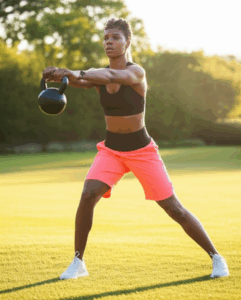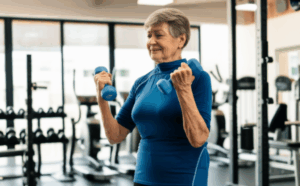In today’s fast-paced world, it’s easy to let exercise fall by the wayside. However, incorporating a regular exercise routine can unlock a wealth of benefits, impacting not just your physical health, but also your mental and emotional well-being. From disease prevention to improved mood and increased energy levels, the advantages of exercise are undeniable.
The Myriad Physical Benefits of Exercise
Regular physical activity offers a multitude of physical health benefits, helping you live a longer, healthier, and more fulfilling life.
Weight Management and Disease Prevention
Exercise is a cornerstone of weight management, helping to burn calories and prevent excess weight gain. It also boosts high-density lipoprotein (HDL) cholesterol, the “good” cholesterol, and decreases unhealthy triglycerides, keeping your blood flowing smoothly and lowering your risk of cardiovascular diseases. Regular physical activity significantly reduces the risk of developing chronic diseases such as:
- Type 2 diabetes and metabolic syndrome.
- Heart disease and stroke, two leading causes of death in the United States.
- Certain cancers, including bowel and breast cancer.
- Osteoarthritis and hip fractures.
Strengthening Muscles and Bones
Exercise plays a vital role in building and maintaining strong muscles and bones. As we age, we tend to lose muscle mass, strength, and function, increasing the risk of injury. Regular physical activity is essential for reducing muscle loss and maintaining strength as you age.
Exercise also helps build bone density, which may help prevent osteoporosis later in life. Impact exercises like gymnastics, running, or soccer may promote higher bone density than no-impact sports like swimming and cycling.
Boosting Energy Levels and Improving Cardiovascular Health
Feeling winded by everyday tasks? Regular physical activity can improve your muscle strength and boost your endurance. Exercise sends oxygen and nutrients to your tissues and helps your cardiovascular system work more efficiently. As your heart and lung health improve, you’ll have more energy to tackle daily chores.
Aerobic exercise boosts your cardiovascular system and improves lung health, which may help with energy levels. With regular exercise, your heart becomes more efficient at moving oxygen into your blood, resulting in less demand on your lungs.
Improving Sleep Quality
Regular physical activity can lead to improved sleep quality, reduced sleep latency (the time it takes to fall asleep), and better overall sleep quality. Moderate to vigorous exercise can increase sleep quality for adults by reducing sleep onset and decreasing the amount of time they lie awake in bed during the night.
The Mental and Emotional Rewards of Exercise
The benefits of exercise extend far beyond the physical realm, profoundly impacting your mental and emotional well-being.
Elevating Mood and Reducing Stress
Exercise has been shown to improve your mood and decrease feelings of depression, anxiety, and stress. Physical activity stimulates brain chemicals that may leave you feeling happier, more relaxed, and less anxious.
Exercise may increase brain sensitivity to serotonin and norepinephrine, hormones that relieve feelings of depression. It may also increase the production of endorphins, which help produce positive feelings and reduce the perception of pain.
Sharpening Memory and Cognitive Function
Exercise can help you concentrate and feel mentally sharp for tasks at hand. Exercise also stimulates the growth of new brain cells and helps prevent age-related decline. Regular physical activity is important in older adults because it can help slow down the physiological effects of aging in your brain and may also help reduce changes in the brain that can contribute to conditions like Alzheimer’s disease and dementia.
Boosting Self-Esteem and Confidence
Regular activity is an investment in your mind, body, and soul. You may feel better about your appearance and yourself when you exercise regularly, which can boost your confidence and improve your self-esteem.
Managing Mental Health Conditions
Regular exercise can have a profoundly positive impact on depression, anxiety, and ADHD. It also relieves stress, improves memory, helps you sleep better, and boosts your overall mood. Exercise is a natural and effective anti-anxiety treatment. It relieves tension and stress, boosts physical and mental energy, and enhances well-being through the release of endorphins.
Getting Started: A Beginner’s Guide to Exercise
If you’re currently less active than you’d like to be, starting an exercise routine might feel overwhelming. However, with the right approach, exercising can be both achievable and enjoyable, no matter your age or fitness level.
Consulting with a Healthcare Professional
First and foremost, it’s best to get medical clearance from your primary care provider before starting a new type of exercise, especially if you have any existing health conditions.
Setting Realistic Goals
Once you decide to start exercising regularly, try to create a plan that includes attainable steps and goals. Break your fitness goals into small steps to avoid injury-causing exercise mistakes and burnout. Don’t try to do too much too soon. If you’re new to working out, start with a few days a week and gradually increase the frequency and intensity of your workouts as you get stronger.
Choosing Activities You Enjoy
If your workout is unpleasant or makes you feel clumsy or inept, you’re unlikely to stick with it. Don’t choose activities like running or lifting weights at the gym just because you think that’s what you should do. Instead, pick activities that fit your lifestyle, abilities, and taste. Whether it’s walking, biking, or playing a recreational sport, the key to maintaining your exercise routine is doing something you find interesting and enjoyable.
Incorporating Variety
A well-rounded beginner workout plan should include a variety of exercises that target all the major muscle groups. This will help you build strength, endurance, and flexibility.
- Cardio exercises: Walking, jogging, running, biking, swimming, jumping rope, hiking.
- Strength training exercises: Squats, lunges, push-ups, pull-ups, planks, crunches, leg raises.
- Mind-body exercises: Yoga and Tai Chi.
Making Exercise a Habit
Another key component of exercise success is to build a routine that you enjoy and can maintain over the long term. Plan your workouts for the time of day when you’re most awake and energetic. If you’re not a morning person, for example, don’t undermine yourself by planning to exercise before work.
Starting Slowly and Gradually Increasing Intensity
Begin with low-impact activities like walking or light stretching, and gradually increase your intensity and duration as your body adjusts. The current recommendations for most adults is to reach at least 150 minutes of moderate activity per week. You’ll get there by exercising for 30 minutes, 5 times a week. Can’t find 30 minutes in your busy schedule? It’s okay to break things up. Two 15-minute workouts or three 10-minute workouts can be just as effective.
Listening to Your Body
If you’re feeling pain, stop and rest. Don’t push yourself too hard, especially in the beginning.
Staying Motivated and Consistent
Sticking to an exercise routine isn’t always easy with family, work, hobbies, and everything in between. Here are some tips to help you get started and keep you moving, even when life gets busy:
- Find a workout buddy: A workout buddy can help keep you accountable and make exercise more fun.
- Mix things up: Varying your exercise routine can help prevent boredom and keep you engaged.
- Track your progress: Measuring your exercise progress can help you stay motivated.
- Reward yourself: Setting small, achievable goals and rewarding yourself when you reach them can help you stay on track.
- Schedule it: Schedule your workouts like you would any other important appointment.
- Remember why you started: Reflecting on the reasons why you started exercising in the first place can help you stay motivated when you feel like giving up.
The Long-Term Effects of Exercise
The long-term effects of exercise on the body are profound and far-reaching.
Cardiovascular Gains
Resting heart rate and blood pressure will drop as the system becomes more efficient. Cardiac hypertrophy will take place as the cardiac muscle of the heart becomes larger and stronger. Stroke volume and cardiac output will increase because the heart will be able to contract with more power.
Muscular Adaptations
Anaerobic exercises can increase the size of muscles involved in the exercise (hypertrophy). Repeated exercise such as sit-ups, the muscles involved will be able to endure more exercise over time.
Improved Overall Health and Longevity
People who do regular physical activity have a lower risk of: coronary heart disease and stroke, type 2 diabetes, certain cancers, early death, osteoarthritis, hip fracture, falls (among older adults), depression, and dementia, including Alzheimer’s disease.
Every Move Counts
The World Health Organization (WHO) states, “every move counts towards better health”. Committing to any regular activity is going to offer benefits beyond doing nothing at all. The key thing to remember about starting an exercise program is that something is always better than nothing. Going for a quick walk is better than sitting on the couch; one minute of activity will help you more than no activity at all.
Future-Proofing Your Health
Exercise is not just about looking good or fitting into your clothes; it’s about future-proofing your health – staying physically capable and independent, as well as mentally sharp and vibrant, rather than struggling with disease, chronic pain, mobility issues, frailty, or a loss of independence. By making exercise a non-negotiable part of your life, you’re investing in a future where you can thrive for as long as possible.







